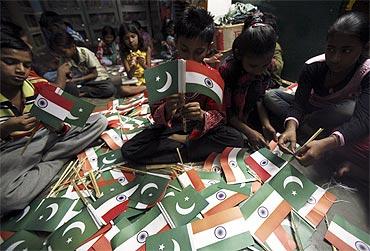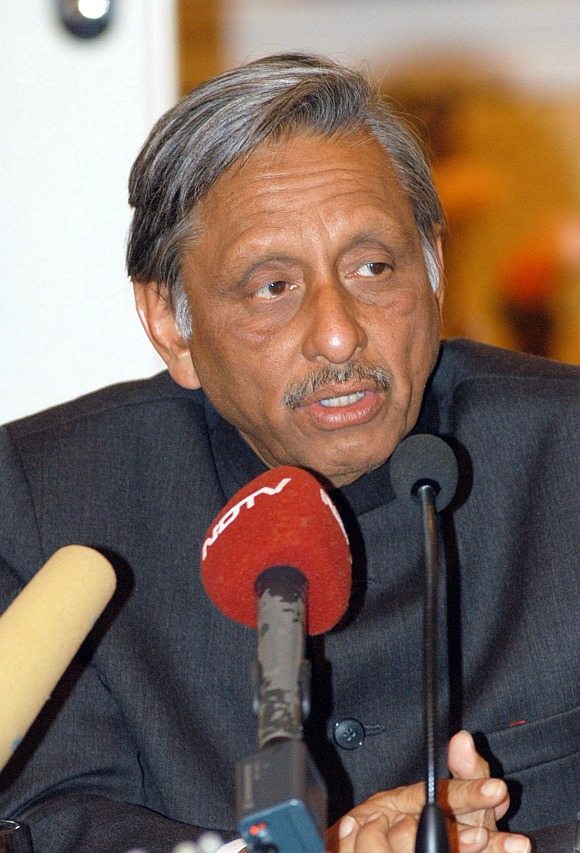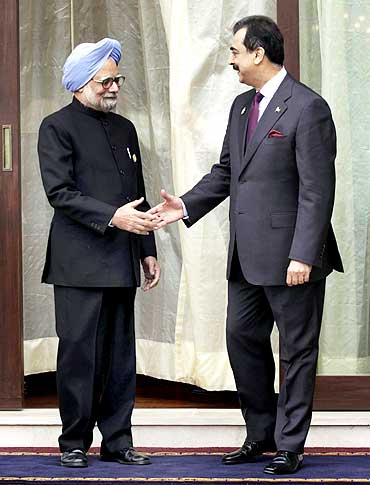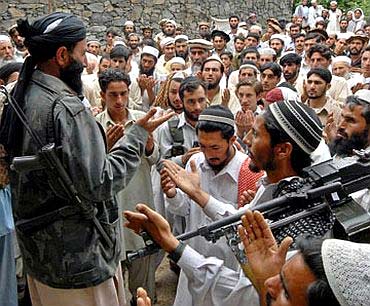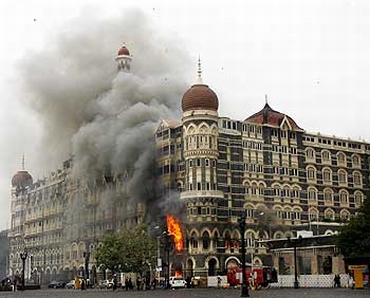 | « Back to article | Print this article |
Relations with Pak should be India's top priority: Aiyar
Scoffing at former minister Mani Shankar Aiyar's suggestion of close India-Pakistan cooperation on combating terror, Lalit Mansingh, former ambassador to the United States, argued that India needs to discuss with countries like China and Pakistan from a position of strength. Aziz Haniffa reports.
Indian parliamentarian, erstwhile minister and ex-diplomat, Mani Shankar Aiyar, was one of the panelists at a major conference in Washington last week on India. The conference was held under the aegis of George Washington University's Sigur Center for Asian Studies and the Center for a New American Security -- a leading DC think tank.
Aiyar, who started the discussion of Indian views on national security and defence, at the conference titled, 'India as a Global Power: Contending Views from India' was his usual; controversial, provocative, and funny.
At the outset, he said, "The biggest threat to our national security is ourselves; if we continue to live with the illusion that we are a global power or aspire to be a global power, then we will be endangering ourselves."
"But if we stick to our traditional concept of what foreign policy is about, which is eschewing the quest for dominance and use diplomacy as the instrument of promoting peaceful co-existence, then all threats to us get diminished," he said.
Click here to get Realtime News on Pakistan
Click NEXT to read further...
'India of today cannot aspire to be a global power'
Aiyar argued that "our single highest priority ought to be the relationship with Pakistan. I believe that a number of developments, not only in the recent past, but looking back over the past 65 years, would appear to indicate that if we seize the opportunity being presented to us at the moment, it should be possible for us to defuse the tension with Pakistan and thereby remove -- what most Indians would agree -- appears to be the single-most imminent threat to India."
He said that the India-Pakistan relationship "should in some ways follow the pattern of the India-China relationship as established by Rajiv Gandhi since December 1988, which is to assert your own point of view, but not allow it to spillover into tensions or any disruptions of tranquility at the borders."
"And what we have experienced with China over the last 23 years, is the path to go down with Pakistan, with respect to issues that might continue to divide us," he added.
Aiyar asserted that "this does mean that instead of aspiring to be a global power, which would be ridiculous for an India of today to do, since 80 percent of our people have a consumption capacity of less than 50 cents a day at the exchange rate and less than $2 a day at purchasing power parity, for us to pretend that we are a global power or even aspire to be one, until the people of India have been included in the growth process, which at present is involving only a small segment of our population," would be quixotic.
Click NEXT to read further...
'Threat from Pak cannot be confronted by discussion alone'
Lalit Mansingh, former ambassador to the United States and erstwhile foreign secretary, taking exception to Aiyar's contention, argued, "It's not a question of dominance, it's a question of our right to exist as a nation as large as we are and we need to find our place within our region."
"We need at least 10 years of uninterrupted growth at 9 to 10 percent in order to deal with our primary domestic issue, which is poverty," he said.
Mansingh said, unfortunately, for all of Aiyar's call for peaceful co-existence, "There are countries, which are threatening this path of growth and the immediate threats are of the military kind and are only from two countries -China and Pakistan."
The ex-envoy said, "I am not saying that there is an imminent threat of attack from China, but it is a concern."
With regard to Pakistan, Mansingh implied that Aiyar was being utterly naive because Pakistan "threatens India at the conventional level, at the sub-conventional level, which is through terrorism, and at the nuclear level. And, we need to face it not by mere discussion. We have been having a dialogue with both China and Pakistan for all these years (but) we haven't come to any particular understanding."
Thus, he said, "Many of us have come to the conclusion that India needs strength - domestic strength. It has to be strong economically, politically, militarily, and then discuss with countries like China and Pakistan from a position of strength."
Click NEXT to read further...
'Pak-sponsored terror is threat to our peace in an episodic manner'
Mansingh reiterated that "it is not that India is threatening anybody, but India has to have a right to protect its interests and this is the basis of our foreign policy."
Aiyar and Mansingh also clashed over Aiyar's contention that Pakistan-sponsored terrorism against India is "a threat to our peace in an episodic manner," and that "it is hardly a threat to the nation's security as a whole because the worst terrorist incident took place over a period of two or three days in Mumbai."
"Most other terrorist incidents take place in one or two blasts, at one or two places and we've got a lot of terrorism going, which is domestic rather than international," he added.
While acknowledging that "terrorism from Pakistan is definitely a problem," particularly when it is "either state-sponsored or quasi-state sponsored," Aiyar argued that "I do believe that to the extent to which it is state or quasi-state sponsored, the best answer for India lies in establishing a cooperative relationship with Pakistan; in investigating these terrorist incidents as well as tracking down who are the people responsible."
He said, "The most hopeful sign recently is the decision of Pakistan to send their judicial commission to India as part of the investigation of the terrorist attack that took place in 26/11, as also the continued activity of the anti-terrorist court, which is a special fast-track court in Pakistan."
Click NEXT to read further...
'MEA should stops obsessing about Pakistan'
Mansingh pooh-poohed these so-called gestures by Islamabad and said Aiyar was clearly off base if he believed these Pakistan-sponsored terrorist incidents were "episodic."
"It is episodic if you regard 9/11 as episodic," he said, and noted that sixty thousand people "have lost their lives to terrorists in India. It's a serious issue and the groups based in Pakistan continue to receive the support of the Pakistani authorities," he said. "Their leaders go scot free, they give public speeches -- hate speeches -- asking their followers to attack India, destroy India."
Mansingh scoffed at Aiyar's suggestion that there should be close India-Pakistan cooperation on combating terrorism, and pointed out that all of the discussions thus far had left New Delhi utterly frustrated because "you discuss with Pakistan and then you don't get anywhere."
"Imagine, the fourth year after 26/11, we have completed the trial of the man we nabbed during that terrorist attack and who has been sentenced to death, (but) Pakistan has not even begun the process of the trials."
Furthermore, Mansingh noted, "We ask for voice samples because we have voice samples of the people who were in communication with the terrorists. (But) The Pakistani authorities say we cannot give you the voice samples and that our law doesn't allow it. What kind of cooperation are we getting?"
Aiyar also slammed the ministry of external affairs, alleging that it simply had no vision and predicted that "not until the MEA stops obsessing about Pakistan and starts thinking about our larger security requirements, will we be able to move in that direction."
He said, "When I get to become minister of external affairs, "I hope to sack most of my colleagues," to which Mansingh quipped, "I know that Mani desperately wanted to be minister of external affairs, and I made sure that he was not my boss when I was foreign secretary."
